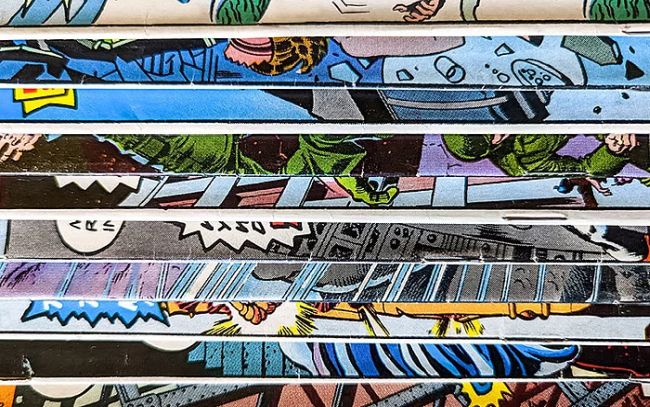While comic books may not hold the same appeal in today's digital world, their legacy is undeniable, influencing decades of storytelling and pop culture. But beyond the capes and catchphrases, there is a much less talked about yet vital aspect of these narratives: Intellectual Property (IP).
Consider that every comic book character is a distinct artistic work with individual storylines, traits and visual elements. No two heroes or villains are exactly alike. This uniqueness can be legally protected. IP law safeguards the creativity of writers and artists, ensuring that the narratives they give life to can evolve within their own worlds.
Understanding the role of IP in comic books reveals a fascinating layer of complexity to how stories are told in bright or brooding universes.
Early days of copyrights in comics
The 1930s and 1950s marked what is often termed the "Golden Age" of comic books, a period that witnessed the emergence of names that would become enduring pop culture icons.
At the forefront of this movement were Jerry Siegel and Joe Shuster, the creators of Superman, who made his debut in "Action Comics #1" in 1938. Produced by National Allied Publications (one of the founding companies of DC Comics), Superman was an instant sensation. However, this success brought to light the importance of copyrights in an industry rapidly growing in popularity.

The history of comic books has been divided into four "ages" with loosely defined time frames: Golden (~1938-1956), Silver (~1956-1970), Bronze (~1970-1985) and Dark (~1985-present). As censorship waned, stories became grittier and began to explore more mature themes.
Siegel and Shuster, eager to see their ideas in print, sold the Superman rights to another antecedent of DC Comics, Detective Comics, for the modest fee of $130 USD. This action, commonplace at the time, meant that the creators retained little control over their work and reaped minimal financial rewards as the stories' popularity soared. In hindsight, the sale price pales in comparison to the character's colossal success. Illustrating the historical and monetary value of this transaction, the original check astonishingly fetched $160,000 USD at an auction in 2012.
For these two artists, years of living paycheck-to-paycheck, grappling with health issues and undertaking various jobs, including as a delivery man and a file clerk, laid bare a critical challenge in the comic book industry: the need for creators to defend their IP. It became clear that without legal protection, the creators' artistic control and financial benefits were at risk.
The legal landscape of the Golden Age
National Allied Publications and Detective Comics merged in 1946 to form National Comics Publications, the company that would officially rebrand as DC Comics in 1977. But only four years after forming, the publisher would become embroiled in perhaps the most well-known dispute of this era. The case of National Comics Publications vs. Fawcett Publications alleged the infringement of the Superman character by Fawcett's Captain Marvel (also known as Shazam). Earlier disputes had occurred over creations like Wonder Man and Master Man, but this marked the first time a company fought the copyright claims.
The similarities between Superman and Captain Marvel, including their superhuman abilities, the theme of a journalistic alter ego and even aspects of their costumes, led to a heated 12-year legal confrontation that ended in Fawcett Publications paying $400,000 USD in damages and retiring the character for years. The landmark case set a precedent for how copyright similarities would be approached – or sidestepped – in the future.

Comic books and their associated merchandise have always appealed to collectors. This inclination, combined with subscription models and in-person events, means that even today, physical comics outsell their digital counterparts. (Image source: iStock. Credit: awiekupo)
During the red-clad superhero's long hiatus, a third company quietly trademarked the name "Captain Marvel" in 1967 to align with its own. Marvel Comics would go on to become DC's main rival, with its sister film studio dominating the movie scene at large for some 15 years. To date, Marvel Studios has released 33 films in its "cinematic universe" and generated upwards of $29.5 billion USD. Yet, in a bizarre twist of fate, even that run may have come to a crashing halt with the recent financial disaster of "The Marvels" film.
Turning our focus back to the creators of Superman, Siegel and Shuster, their struggle with DC Comics also had significant implications. In the spring of 1975, as anticipation built for a major Superman movie, their very personal plight gained public attention. Initially, DC Comics offered Siegel a pension to withdraw from a lawsuit, a promise they reneged on once he complied. The indignity of their mistreatment was brought to light by their fellow cartoonists, who launched a publicity campaign that painted a stark picture of the creators of Superman living in poverty.
This public pressure and the need to maintain an untarnished image ahead of the film project led to Siegel and Shuster receiving pensions at the end of 1975.
The ongoing tussles of trademark protection
Building on the struggles Siegel and Shuster faced, today's comic book industry, led by giants like Marvel and DC, faces its own set of IP difficulties. Now, the value of their portfolios extends beyond the iconic protagonists to the worlds they inhabit, encompassing extraordinary settings, side characters and origin stories.
The expansion from comic books to film and television has introduced new opportunities for generating revenue and complications for retaining exclusivity. DC's standalone "Joker" film and Marvel's development of its cinematic universe, including series like "WandaVision" and "Loki," show a shift toward greater creative freedom when utilizing key properties. Yet, all this can only occur within the confines of strict IP management. Instances of legal enforcement, such as DC Comics' action against a Chicago ice cream parlor over a logo resembling the Superman crest or Marvel and DC's joint legal notices against the use of the term "superhero," underscore the aggressive protection of these assets.

In 2022, the comic book industry was valued at more than $15 billion USD worldwide. But in addition to protecting this entertainment heritage, trademarks for characters and their designs are essential to the films, collectibles and games based on licensed properties. (Image source: iStock. Credit: AndresGarciaM)
What the future holds
The heyday of the comic book's influence has come and gone, with other media based on their heroes, villains and plots far outstripping the source material in prominence. Still, there is much life between the pages. Lockdowns seem to have recovered the industry from a catastrophic tailspin in sales, with a record high of $2.07 billion USD seen in 2021. Newer titles, independent artists, crowdfunding campaigns and online buzz have surely contributed to turning what was viewed until very recently as a niche, passé hobby into something much closer to the mainstream, or at least suitably counter-cultural.
However, the integration of artificial intelligence (AI) into content creation, highlighted by Marvel's use of AI-generated images in "Secret Invasion," raises fresh questions about the role of IP law in this new era. The decision by the United States Copyright Office this year to limit protections for AI-generated comic art could signal a substantial shift in the industry, potentially to the benefit of artists, writers and other creatives.
That said, if there is anything we can learn from the early days of Siegel and Shuster and apply to the current era, it is that the need to protect IP remains as crucial as ever. As the comic book industry continues to evolve, with new characters emerging and stories expanding into various media, the need for expert guidance in managing and maintaining these creative assets becomes increasingly vital.
If you are dreaming up enduring characters, crafting unique storylines or building an iconic brand within the industry, consider partnering with specialists who understand the nuances of IP. Turn to the experts at Dennemeyer for comprehensive support in protecting and managing your IP to ensure that your creative vision and rights are secured for the future.
The content of this article is intended to provide a general guide to the subject matter. Specialist advice should be sought about your specific circumstances.

